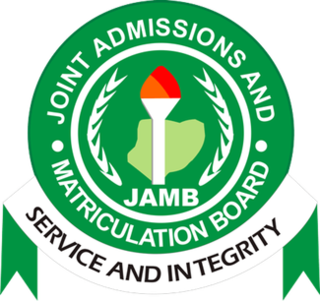Related Research Articles
Abitur, often shortened colloquially to Abi, is a qualification granted at the end of secondary education in Germany. It is conferred on students who pass their final exams at the end of ISCED 3, usually after twelve or thirteen years of schooling. In German, the term Abitur has roots in the archaic word Abiturium, which in turn was derived from the Latin abiturus.
The General Certificate of Education (GCE) is a subject-specific family of academic qualifications used in awarding bodies in England, Wales, Northern Ireland, Crown dependencies and a few Commonwealth countries. For some time, the Scottish education system has been different from those in the other countries of the United Kingdom.

Matriculation is the formal process of entering a university, or of becoming eligible to enter by fulfilling certain academic requirements such as a matriculation examination.
In the Scottish secondary education system, the Higher is one of the national school-leaving certificate exams and university entrance qualifications of the Scottish Qualifications Certificate (SQC) offered by the Scottish Qualifications Authority. It superseded the old Higher Grade on the Scottish Certificate of Education (SCE). Both are normally referred to simply as "Highers".
An examination board is an organization that sets examinations, is responsible for marking them, and distributes the results. Some are run by governmental entities; some are run as not-for-profit organizations.
The South Australian Certificate of Education (SACE) is awarded to students who have successfully completed their senior secondary schooling in the state of South Australia.

The Hong Kong Advanced Level Examination, or more commonly known as the A-level, conducted by the Hong Kong Examinations and Assessment Authority (HKEAA), was taken by senior students at the end of their matriculation in Hong Kong between 1979 and 2012. It was originally the entrance examination in University of Hong Kong until the introduction of the Joint University Programmes Admissions System (JUPAS) in 1992, which made it the major university entrance examination until academic year 2011/2012.
University admission or college admission is the process through which students enter tertiary education at universities and colleges. Systems vary widely from country to country, and sometimes from institution to institution.
A school leaving qualification is an academic qualification awarded for the completion of secondary education. Depending on the country or region, it may alternatively be known as a high school diploma, senior secondary leaving certificate, high schools general certificate or school certificate.

The West African Examinations Council (WAEC) is an examination board established by law to determine the examinations required in the public interest in the English-speaking West African countries, to conduct the examinations and to award certificates comparable to those of equivalent examining authorities internationally. Established in 1952, the council has contributed to education in Anglophone countries of West Africa, with the number of examinations they have coordinated, and certificates they have issued. They also formed an endowment fund, to contribute to education in West Africa, through lectures and aid to those who cannot afford education. Since established it continues to be one of the biggest and most globally recognized exams in West Africa.

Education in Nigeria is overseen by the Federal Ministry of Education. The local authorities take responsibility for implementing state-controlled policy regarding public education and state schools. The education system is divided into Kindergarten, Primary education, Secondary education, and Tertiary education. Nigeria's federal government has been dominated by instability since declaring independence from Britain, and as a result, a unified set of education policies is yet to be successfully implemented. Regional differences in quality, curriculum, and funding characterize the education system in Nigeria. Currently, Nigeria possesses the largest population of out-of-school learning youths in the world. The educational systems in Nigeria are divided into two the public where the student only pays for PTA while the private where students pay school fees and some other fees like sports, exam fees, computer fees etc. and they are costly

The Joint Admissions and Matriculation Board (JAMB) is a Nigerian entrance examination board for tertiary-level institutions. The board conducts entrance Unified Tertiary Matriculation Examination for prospective undergraduates into Nigerian universities. The board is also charged with the responsibility to administer similar examinations for applicants to Nigerian public and private monotechnics, polytechnics, and colleges of educations. All of these candidates must have obtained the West Africa Senior School Certificate (WASSCE) conducted yearly by the West African Examinations Council, WAEC, or its equivalent, National Examination Council (Nigeria), Senior School Certificate Examination, NECO SSCE.

The A-level is a subject-based qualification conferred as part of the General Certificate of Education, as well as a school leaving qualification offered by the educational bodies in the United Kingdom and the educational authorities of British Crown dependencies to students completing secondary or pre-university education. They were introduced in England and Wales in 1951 to replace the Higher School Certificate. The A-level permits students to have potential access to university if their grades are of satisfactory quality.

The Hong Kong Diploma of Secondary Education Examination (HKDSE) is an examination organised by the Hong Kong Examinations and Assessment Authority (HKEAA). The HKDSE examination is Hong Kong's university entrance examination, administered at the completion of a three-year senior secondary education, allowing students to gain admissions to undergraduate courses at local universities through JUPAS. Since the implementation of the New Senior Secondary academic structure in 2012, HKDSE replaced the Hong Kong Certificate of Education Examination and Hong Kong Advanced Level Examination.
In South Africa, matriculation is the final year of high school and the qualification received on graduating from high school, and the minimum university entrance requirements. The first formal examination was conducted in South Africa under the University of the Cape of Good Hope in 1858. In general usage, the school-leaving exams, which are government-administered, are known as the "matric exams"; by extension, students in the final year of high school are known as "matriculants" or, more commonly, "matrics". Once the Matric year has been passed, students are said to have "matriculated". See List of secondary education systems by country § South Africa.

The term senior, in regard to education, has different meanings depending on the country.
In Nigeria, the academic grading system scales from A to F (fail). Below is the grading system of Nigerian schools.
References
- ↑ Karen Wells (8 November 2019). Teen Lives around the World: A Global Encyclopedia [2 volumes]. ABC-CLIO. p. 330. ISBN 978-1-4408-5245-9.
- ↑ Coert Loock; Vanessa Scherman (20 November 2019). Educational Assessment in a Time of Reform: Standards and Standard Setting for Excellence in Education. Taylor & Francis. p. 27. ISBN 978-0-429-68547-7.
- ↑ "Guidelines for university entrance". West African Examination Council, Nigeria portal– via waecnigeria.org.
- ↑ "Database on admission requirements". German Academic Exchange Service, Germany.